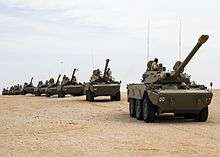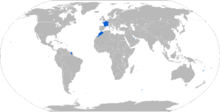AMX-10 RC
The AMX-10 RC is a reconnaissance vehicle built by GIAT. Over 240 are in service in the French Army. In addition, 108 vehicles were sold to Morocco and 12 to Qatar. RC stands for Roues-Canon, or wheeled gun.
| AMX-10 RC | |
|---|---|
AMX-10 RC | |
| Type | Armoured car |
| Place of origin | France |
| Service history | |
| In service | 1981–present |
| Wars | Western Sahara War Gulf War War in Afghanistan Operation Serval |
| Production history | |
| Designed | 1970 |
| No. built | 457 |
| Specifications | |
| Mass | 15.8 tonnes (17.4 short tons; 15.6 long tons) 16.6 tonnes (18.3 short tons; 16.3 long tons) with add-on armor 17.2 tonnes (19.0 short tons; 16.9 long tons) AMX-10 RCR 22 tonnes (24 short tons; 22 long tons) with the SEPAR mine/IED protection kit |
| Length | 9.15 m (30 ft 0 in) (gun forward) 6.24 m (20 ft 6 in) (hull only) |
| Width | 2.78 m (9 ft 1 in) |
| Height | 2.56 m (8 ft 5 in) |
| Crew | 4 |
| Armor | Frontal armour resistant against 23 mm API from 300 m 14.5 mm AP all-around with add-on armor |
Main armament | 105 mm F2 BK MECA L/47 medium-pressure gun (38 rounds) |
Secondary armament | 1× 7.62 mm NF1 coaxial machine gun (4,000 cartridges) 1× 12.7 mm M2HB AA machine gun (Optional) 4× GALIX smoke dischargers |
| Engine | Hispano-Suiza HS-115 multifuel (1981-1985)
Baudouin Diesel Model 6F11 SRX (current) |
| Power/weight | from 16 hp/tonne |
| Suspension | variable hydropneumatic |
Operational range | 800 km (500 mi) on road |
| Maximum speed | 85 km/h (53 mph) on road 40 km/h (25 mph) off road |
The AMX-10 RC should not be confused with the AMX-10P; they share automotive components but otherwise have completely different battlefield roles. The AMX-10RC is usually used for reconnaissance missions in dangerous environments or for fire support.
Design and characteristics
Initial work on the AMX-10RC began in 1970; prototypes testing began in 1976, and the first production vehicle was delivered in 1981 to the 2nd Regiment de Hussards in Sourdun. The vehicle features a powerful GIAT 105 mm gun mounted in a welded aluminium turret. The TK 105 turret also serves to house three crew members, while the driver sits in the front of the hull; the COTAC fire control system is provided for gun aiming. All six wheels are driven, and the AMX-10RC uses skid steering to turn the hull.
Engine
The AMX-10 RC initially used the Hispano-Suiza HS 115-2, multi-fuel, liquid-cooled, supercharged V8 engine rated at 250 hp at 3,200 RPM.
In 1985, the Baudouin 6F11 SRX supercharged diesel engine was selected to equip the last production AMX-10 RC vehicles as a production cut-in as well as for eventual retrofit to all AMX-10 RC vehicles of the French Army. This engine is rated at 300 hp, but governed at 280 hp at 3,000 RPM in the French army.
No matter which engine is fitted, a 24 volt electrical system with six 12-volt/100-ampere-hour batteries is standard. Two waterjets, mounted on each side of the hull at the rear, are used for water propulsion.
Transmission
The AMX-10 RC vehicles use an unspecified preselector gearbox with four forward and four reverse gear ratios. The clutch is electro-magnetically operated and the gearbox is fitted with a torque converter. A power take-off unit operates the two waterjets. The AMX-10 RC is skid steered and can perform pivot turn.
Suspension and running gear
The 6x6 AMX-10 RC is fitted with a hydropneumatic suspension system with variable ground clearance and tilt, provided by Messier Auto-Industry. A centralized lubrication and tire inflation system is fitted. A shock damper is mounted at each wheel station.
Armament
The AMX-10 RC is fitted with a 105/47 F2 MECA 105 mm medium-pressure gun mounted in a GIAT Industries TK 105 three-man turret; the F2 cannon fires 105×527R proprietary ammunition. The turret use a SAMM CH49 electrohydraulic gun control system, but no stabilization system is fitted. An NF-1 7.62 mm machine gun is mounted coaxially to the main armament, and two electrically-operated smoke grenade launchers are mounted on each side of the turret. A total of 38 main gun rounds and 4,000 rounds of 7.62 mm ammunition and 16 smoke grenades are carried.
| Ammunition type | Designation | Round weight (kg) |
Projectile weight (kg) |
Muzzle velocity (m/s) |
Penetration (mm) |
|---|---|---|---|---|---|
| HEAT-FS | OCC 105 F3 | 13,85 kg | 5,7 kg | 1120 m/s | >350 mm (at 0° incidence) >150 mm (at 60° incidence) |
| High-Explosive | OE 105 F3 | 13,7 kg | 7,2 kg | 800 m/s | - |
| Target Practice / Dummy | BSCC 105 F3 | 13,85 kg | 5,7 kg | 1120 m/s | - |
| APFSDS | OFL 105 F3 | 13 kg | 3,8 kg | 1400 m/s | NATO Single Heavy Target at 1200 m (150 mm at 60° incidence) NATO Triple Heavy Target at 2200 m |

The F2 105 mm medium-pressure rifled gun fires four types of 105×527R ammunition: OFL 105 F3 APFSDS, OE 105 F3 HE, OCC 105 F3 HEAT-FS and the BSCC 105 F3 target practice round. The APFSDS, which uses the penetrator from the GIAT OFL 90 F1 mm APFSDS round, is capable of defeating a NATO single heavy tank target at a range of 1200 metres and the NATO triple heavy tank target at a range of 2200 metres.
The AMX-10 RC has been the recipient of numerous upgrades over its lifetime. The DIVT-13 LLTV was replaced by using DIVT-16, 18 and 19 CASTOR thermal sights taken from decommissioned AMX-30B2 MBTs. For its part in the 1991 Gulf War, the AMX-10 RC was provided with extra high-hardness steel add-on armour and EIREL infrared jammer. The original muzzle brake was replaced by an even more efficient one (10% recoil reduction) after the introduction of the OFL 105 F3 APFSDS in 1987. The flotation barrier and the water pump jets were removed (their intakes were sealed).
The AMX-10 RCR introduced a FINDERS C2R battlefield-management system. One improvement considered was the installation of the TML 105 modular light turret armed with a more powerful 105 mm G2 high-pressure gun, as the F2 gun was not compatible with NATO munitions, but this was ultimately not done. A central tire-inflation system is available for added traction over soft terrain. The AMX-10RC is equipped with an NBC (Nuclear/Biological/Chemical) protection system and may conduct reconnaissance in a radioactive environment.
AMX-10 RCR modernisation
In 2010, Nexter completed the modernisation of 256 AMX-10 RC vehicles to the RCR (Rénové; renovated) configuration, a programme that consisted of integrating various systems and additional armour, active self-protection by SAGEM, LIRE (Leurre InfRarougE, infrared flare), the SIT (Système d'Information Terminal) V1 battlefield management system, Galix smoke grenades launchers, changes in the NBC protection and improvements in the suspension, and the speed gearboxes and tactical communications completed with Thales Communications & Security PR4G VS4. The integration was done by DCMAT (Direction Centrale du Matériel de l'Armée de Terre, Land Army Central Matèriel Directorate).[1]
Replacement
The AMX-10 RC is no longer in production and will be replaced by the EBRC Jaguar in French service.
Operators

Variants
- AMX-10 RC : initial production model with amphibious capability.
- AMX-10 RC surblindé (uparmored) : fitted with add-on armor and without amphibious capability.
- AMX-10 RCR revalorisé (upgraded)
Prototypes
- AMX-10 RTT : APC version.
- AMX-10 RAC : fitted with the TS 90 turret armed with a 90 mm gun.
- AMX-10 RAA : AAA version first presented at Satory in 1981. It featured a large turret armed with two 30 mm autocannons.
- AMX-10 RC with TML 105 : AMX-10 RC fitted with the Tourelle Modulaire Légère (Light Modular Turret) featuring a stabilized G2 high-pressure 105 mm gun, GALIX launchers and new sights. A two-man configuration with a bustle-mounted autoloader was available as an option.
Missions
- Armoured reconnaissance
- Armoured support
- Flanking security
References
- International Institute for Strategic Studies (IISS) (2016). The Military Balance 2016. London: IISS. p. 96. ISBN 978-1-85743-835-2.
- "Trade Registers". Armstrade.sipri.org. Archived from the original on 13 May 2011. Retrieved 1 January 2015.
External links
| Wikimedia Commons has media related to AMX-10 RC. |